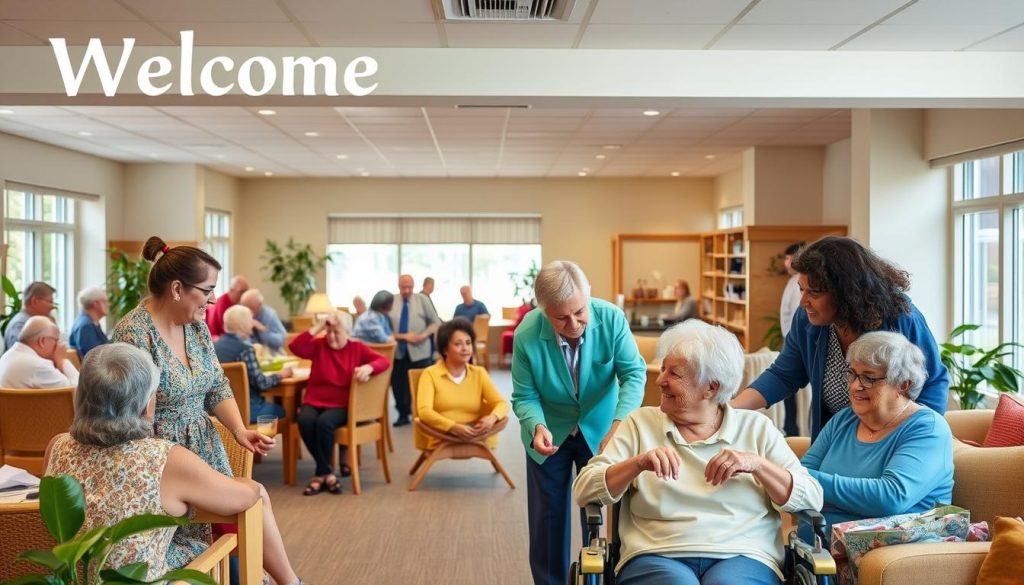Could the right dementia care programs change the lives of those with Alzheimer’s and their families? Nearly 6 million people in the US have dementia. This number will grow. Caregivers and families struggle to give quality care that fits the needs of those with dementia. The care landscape is changing with programs and support to help individuals and families. This guide talks about these programs designed to help patients and caregivers12..
Key Takeaways
- The prevalence of dementia in the U.S. is increasing rapidly, emphasizing the need for effective dementia care programs.
- Various specialized Alzheimer’s support programs are available to assist both patients and caregivers.
- Quality dementia care can significantly improve the quality of life for individuals living with dementia.
- Understanding the unique needs of dementia patients is crucial for providing appropriate senior care for dementia patients.
- Continuing education and resources for caregivers can impact the overall well-being of families affected by dementia.
The Importance of Dementia Care Programs
Dementia affects not just those who have it but their families and caregivers too. In the US, lots of people face Alzheimer’s and other dementias. This puts a lot of stress on support systems. Around 50 million folks worldwide are living with Alzheimer’s and similar conditions. The goal is double: give good care and look after the caregivers3.
Understanding the Impact of Dementia
The impact of dementia is deep. Over 11 million unpaid helpers are the main caregivers, giving care worth $272 billion in 20214. More than 80% of dementia care comes from these family members. Nursing homes have a hard time meeting the needs of dementia patients. Less than 5% of beds are for those needing special care5. This shows we really need better dementia care programs.
Benefits of Effective Dementia Care
Focused dementia care programs bring many benefits. They can make life better and reduce symptoms for patients. An expert group says these programs should be everywhere. They could improve mental health care all over4;5. Places with more dementia patients usually do a better job caring for them. Especially those with over 90% dementia patients5. When caregivers get better training and resources, they can help more. This makes things better for the person with dementia.
Overview of Dementia Care Facilities
Dementia care facilities provide special care for those with dementia. They create a supportive place for residents to live well. Choosing the right facility is key for families helping someone with dementia.
Types of Facilities Available
- Retirement Housing: Good for those in early Alzheimer’s who can still care for themselves. They need little help but enjoy social activities.
- Assisted Living Facilities: These are for those needing more help than in retirement housing. They offer meals and health services. Laws are different in each state6.
- Nursing Homes: They give 24-hour care and medical help. The government sets rules on how many staff are needed for residents6.
- Alzheimer’s Special Care Units: These give special care for dementia patients within living communities. They must meet certain state rules6.
- Life Plan Communities: Residents can move to different care levels as needed. Payment options vary6.
Key Features of Quality Care Facilities
When looking at dementia care places, important features matter a lot. These features help residents have a better life.
- It’s key that families are part of care planning.
- Staff should have training in dementia care for personalized support.
- Access to dementia care specialists is important.
- Safe and engaging places help with independence and meeting friends.
- Fun activities keep residents happy and healthy.
Also, how safe the place is, the quality of meals, and family visit rules are very important. Family influence, the number of staff, and safe spaces matter a lot in choosing the right place67. These are essential for making a good choice for dementia care8.

Dementia Care Programs Offered by the Alzheimer’s Association
The Alzheimer’s Association runs many care programs for people with dementia. These programs aim to improve life for those with Alzheimer’s and other dementias. They focus on the best care, putting the person first, and strong support networks for families.
Guidelines for Quality Care Practices
The Association stresses the need to follow Dementia Care Practice Recommendations. These rules make sure the care for people with dementia is safe and helpful. A 24/7 Helpline at 800.272.3900 offers free, private help. Trained staff offer advice and emotional support9.
Educational programs are made for caregivers and those living with the disease. They help everyone understand the stages of dementia and how to care best10.
Person-Centered Care Approach
This method means including people in care choices, respecting their dignity, and preferences. Programs like “Living with Alzheimer’s” teach caregivers and patients about communication and behavior10.
Initiatives for those in early stages help maintain social and emotional support9.
Comprehensive Support for Families
Families are key in dementia care. The Alzheimer’s Association offers resources to educate and empower caregivers. There are support groups online and in-person. Families can share tips and get advice9.
Tools like ALZNavigator™ and the Community Resource Finder provide important care information9. The organization promotes early planning and safety, preparing caregivers for what’s coming10.
Government-Initiated Dementia Care Models
Nearly 55 million people globally are living with dementia. This number is expected to reach 78 million by 203011. Governments have started dementia care models like the GUIDE (Guiding an Improved Dementia Experience) Model to improve care quality. They focus on better coordination and management.
Introduction to the GUIDE Model
The GUIDE Model aims for a full care approach to dementia. It brings together interdisciplinary teams. These teams work to make care plans that meet individual needs12.
This leads to more effective memory care programs. Care plans are made to fit the unique situations of each patient.
Structure of Care Coordination and Management
This model uses a structured way to coordinate care. Healthcare professionals join forces in this effort13. Their work supports family caregivers. This helps caregivers manage better and ensures top care for their loved ones.
It connects caregivers with helpful community resources. This eases their load and betters their life quality.
Impact on Caregivers and Community Resources
The model benefits those with dementia and their caregivers. It links caregivers to community services for needed support13. These efforts might help ease the economic costs of dementia, which could hit $2.8 trillion globally by 203011.

Specialized Memory Care Programs Across the US
As dementia gets worse, people need special programs to help them. These programs look at what each person needs. They make sure the care is just right for them. It’s important to pick the best program. This means looking at how good the staff is, what the place feels like, and how the care is designed for each person.
What to Look for in a Specialized Program
Here’s what to check when picking a memory care program:
- Staff Qualifications: It’s best if the team knows a lot about memory care. Some programs need 3 hours or even 10 hours of special training14.
- Facility Environment: A safe and fun place makes life better for everyone. Activities that make you think are key.
- Individualized Care Plans: Care plans should be made just for the person. They should think about how far along the dementia is.
Programs Tailored for Different Dementia Stages
There are special programs for each stage of dementia:
- Early stages have programs like Whole Brain Fitness. They use food and brain games to help15.
- Circle of Friends® is great for those who need more help. It keeps the brain active with special activities.
- For advanced dementia, some places have special activities and exercises. They make sure the staff knows how to help15.
Memory Care Services and Support for Families
Learning about memory care services is key for families helping with dementia. Getting educated as caregivers is crucial. It helps them offer better support to their loved ones.
This ensures the patient’s well-being is always looked after.
Importance of Caregiver Education
Caregiver education gives families and professionals the know-how to aid those with dementia. It covers recognizing symptoms, handling behaviors, and dealing with emotional stress. Educated caregivers make environments that lead to improved care16.
Community Resources and Support Networks
Community resources offer critical support, helping families find help when they need it. They include support groups, workshops, and respite care. Using these services can lower stress and bring families together exploring available services is wise.
Having a support network boosts connections, providing emotional support. Signing up for local programs or workshops boosts care skills. This leads to a better life for caregivers and those with dementia.
| Resource Type | Description |
|---|---|
| Support Groups | Provides emotional support and information sharing among caregivers. |
| Educational Workshops | Offers training on dementia care best practices and coping strategies. |
| Respite Care | Temporary care services that allow caregivers to take breaks while ensuring quality support for their loved ones. |
| Local Helplines | Access to quick advice and answers for immediate caregiving challenges. |
Using memory care services and improving caregiver education builds strong support. This makes caregiving easier. It also betters the life quality for those with dementia1716
How to Choose the Right Dementia Care Program
Choosing the right dementia care program is very important. It helps those with cognitive decline. Think about their needs, likes, and elder care options.
Assessing Individual Needs and Preferences
You need to know the type of dementia and care needed. In the middle stages, 24-hour watch is a must. Later, more care is needed18. Consider safety, health, and how much care they need. Also, think about how they can still enjoy social activities. You can find good programs through the Alzheimer’s Association, doctors, or senior centers18.
Evaluating Program Quality and Outcomes
Finding a good dementia care program means checking its quality. Look at things like accreditation and the caregiver ratio. Usually, there should be one caregiver for every five or six residents19. Ask questions to learn about their training, services, and care plans. Check their backgrounds and talk to others who have used them18.
Money matters too. Selling a house might help with care costs. Medicaid might help, but not always. Medicare usually doesn’t cover living costs in these programs19. When talking to providers, share the patient’s medical and insurance info. This helps you fully understand the options18.
Choosing the right program takes careful thought. By really looking into the care quality and what your loved one needs, you can make the best choice. This choice will help them have better care.
Dementia Care Planning Services: A Path to Better Outcomes
Dementia care planning helps those with Alzheimer’s and related dementias. It lets families manage care better. This includes checking patients’ needs and supporting caregivers.
With the right plan, care can grow with the patient’s needs. This leads to better health.
The Role of Care Planning in Dementia Care
Planning for dementia care improves life by giving personal care. Over 6 million Americans have Alzheimer’s but many don’t know it. Finding what each person needs is key20.
Care partners are vital but often overlooked. It’s important to include them in care plans20. Doing so helps make better choices and keeps patients safe.
Collaboration with Healthcare Providers
Working with healthcare providers is key to good dementia care planning. We need strong support networks for the 55 million people with dementia21. Programs for Alzheimer’s focus on teamwork. This makes sure everyone knows the care plan.
Including care partners in planning helps everyone feel supported20. Studies show this can make a big difference in care results20.
Conclusion
Dementia care programs are very important. They help people with dementia and their caregivers a lot. These programs make life better by offering support and resources for everyone involved22.
Research shows that the right Alzheimer’s support is key. It can make symptoms less and help caregivers too23. Early help and ongoing support make a big difference for people with dementia.
We need to use all the help for dementia care we can. Programs and community help can make living with dementia easier. It’s about everyone working together to support those with this condition24.
Source Links
- GUIDE Model – Dementia Care Aware
- Dementia Care Practice Recommendations
- An integrative approach to dementia care
- Dementia care programs help, if caregivers can find them
- Specialized dementia care in nursing homes linked to better outcomes for residents
- Long-Term Care
- Dementia Care
- An Overview of Dementia Care Across the Globe
- Programs and Support
- Educational Programs and Dementia Care Resources
- Evaluation of major national dementia policies and health‐care system preparedness for early medical action and implementation
- Implementing Dementia Care Models in Primary Care Settings: The Aging Brain Care Medical Home (Special Supplement)
- Support for People with Dementia, including Alzheimer’s Disease
- Recognized Dementia Care Training Programs
- No title found
- What Caregivers Should Know About Memory Care
- Therapies for Dementia: More Than Medication
- Choosing Care Providers
- 10 Questions to Ask When Considering a Memory Care Community | Alzheimer’s Foundation of America
- Catalyzing Dementia Care through the Learning Health System and Consumer Health Information Technology
- Mapping the evidence on dementia care pathways – A scoping review
- COMPLEXITY OF SYSTEMS FOR DEMENTIA CARE, SERVICES, AND SUPPORTS – Meeting the Challenge of Caring for Persons Living with Dementia and Their Care Partners and Caregivers
- Effectiveness and Safety of Dementia Care Management in Primary Care: A Randomized Clinical Trial
- The Importance Of Dementia Care Plan

Leave a Reply